|
|
|
Sort Order |
|
|
|
Items / Page
|
|
|
|
|
|
|
| Srl | Item |
| 1 |
ID:
130606
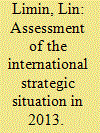

|
|
|
|
|
| Publication |
2014.
|
| Summary/Abstract |
The international strategic situation in 2013 appeared very calm than ever before and had no outstanding features; the fact of its having no special feature was its de?ning characteristic. Although 2013 could be
characterized as a normal year, the international strategic situation has undergone some profound changes. One of the most important is that the United States may have quietly given up its role of the "world police." The 'post-American era' has begun to arrive without attracting much attention in the international community. Many of these profound changes, including the long-term downturn of the world economy, the ongoing process of the West 's decline and the rise of the East, the endless chaos in the Middle East, readjustments in the international order and great power relations, and the evolving relationship between China and the U.S. are all closely related with this dawning of the 'post-American era.' Thus, the 2013
international strategic situation could be seen as holding the seeds of greater change than has been seen since the collapse of the Soviet Union in 1991.
|
|
|
|
|
|
|
|
|
|
|
|
|
|
|
|
| 2 |
ID:
130170


|
|
|
|
|
| Publication |
2014.
|
| Summary/Abstract |
Asia's middle powers face a trilateral dilemma stemming from their relationships with the U.S. and China. This paper uses the Australian example to examine the dilemma. It shows that Australia has bound itself to the U.S. because of domestic political factors, cost considerations, a belief that it can keep its interests separate, and its perception of regional threats. The paper then argues that others are likely to resolve their trilateral dilemmas in ways that make the regional strategic dynamic more competitive.
|
|
|
|
|
|
|
|
|
|
|
|
|
|
|
|
| 3 |
ID:
123973
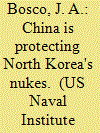

|
|
|
|
|
| Publication |
2012.
|
| Summary/Abstract |
Rear Admiral Erick A McValdon, US Navy, (Retired), senior advisor and director emeritus for Asia-Pacific Studies, Institute for Foreign Policy Analysis-IFPA- Mr. Bosco and I are obviously not going to agree on whether China wants North Korea to have nuclear weapons. We do, nonetheless, both want Beijing to play an effective role in getting Pyongyang to relinquish its nuclear weapon programs. Many of us are conscientiously pursuing that including via a series of senior level Track 1.5 (government, thing tank, etc.) workshops organized by the US Institute for Foreign Policy Analysis over almost a decade.
|
|
|
|
|
|
|
|
|
|
|
|
|
|
|
|
| 4 |
ID:
158793
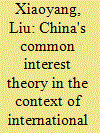

|
|
|
| 5 |
ID:
158769
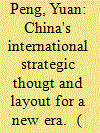

|
|
|
| 6 |
ID:
133955
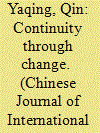

|
|
|
|
|
| Publication |
2014.
|
| Summary/Abstract |
The 'assertive China discourse' has become a widespread narrative in the United States and certain other countries, and there is a parallel narrative in China. It argues that China has abandoned the taoguangyanghui (Keeping a low profile) strategy and adopted that of fengfayouwei (Striving for achievements), especially since 2009. This article, taking background knowledge as the most important factor of an agent's thinking and doing, argues that the Zhongyong dialectic constitutes a core component of background knowledge on the Chinese. It holds that a strident turn from one strategy to the other is inadvisable, and indeed continuity through change is a realistic description of China's present international strategy. It implies the existence of both continuity and change, although the former is its main theme with regards to strategic goals, designs, and policies as a whole. Changes, however, do occur, mainly through issues perceived as relevant to core national interests. The textual analysis in this article provides support for this argument, but offers little to substantiate the 'assertive China discourse'. Also worthy of note is that it is easy to use such changes to infer a revolutionary turn in China's international strategy, as the 'assertive China discourse' has done, as it fits perfectly into the embedded Hegelian dichotomous structure under the background of a realist tragedy of major power politics. Such an interpretation, however, is both biased and dangerous, because it attempts to turn a constructed narrative into a conventional wisdom. This could potentially culminate in a self-fulfilling prophet of the zero-sum struggle in a Hobbesian jungle, particularly between China and the United States.
|
|
|
|
|
|
|
|
|
|
|
|
|
|
|
|
| 7 |
ID:
146491
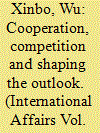

|
|
|
|
|
| Contents |
The United States has long maintained a significant political, economic and security presence in the Asia–Pacific region and has been a major factor shaping China's geopolitical and geo-economic environment. Over the last few years, China has demonstrably attached higher priority and devoted more resources to its neighbourhood diplomacy. This article examines the impact of the so-called ‘US factor’ on this recent shift in Beijing's international strategy under the new leadership of Xi Jinping. It looks at both cooperation/coordination and competition/conflict between China and the United States in a number of regional security issues in China's neighbourhood, such as in the Korean peninsula, Afghanistan and the South and East China Seas. It argues that it is principally the Obama administration's ‘rebalance to Asia’ strategy that has prompted China to take a number of initiatives to attend to its neighbourhood diplomacy. As Washington rebalances to Asia and Beijing rebalances to its neighbourhood, interactions between China and the US on China's periphery have intensified, which in turn has a significant impact on the configuration of China's neighbourhood diplomacy, as well as on the evolving regional order.
|
|
|
|
|
|
|
|
|
|
|
|
|
|
|
|
| 8 |
ID:
031204


|
|
|
|
|
| Publication |
New York, Monthly Review Press, 1972.
|
| Description |
vi, 506p.hbk
|
|
|
|
|
|
|
|
|
|
|
|
Copies: C:1/I:0,R:0,Q:0
Circulation
| Accession# | Call# | Current Location | Status | Policy | Location |
| 011101 | 951.05/MAC 011101 | Main | On Shelf | General | |
|
|
|
|
| 9 |
ID:
124175
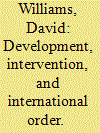

|
|
|
|
|
| Publication |
2013.
|
| Summary/Abstract |
The project of international development involves the reordering of states (or at least attempts to do so), it sits at the intersection between transnational forces and bounded political entities and it is a manifestation of the will to order of powerful states. It would seem then to be closely connected to practices of intervention. At times, the practices of development agencies have taken on a more interventionist character, but in recent years their relationship to many developing countries has taken on a more intricate, subtle, and everyday form. It has in important respects moved 'beyond' intervention. This has significance beyond international development. Development agencies have been recruited to wider projects of international ordering, especially the construction of regimes of global governance and the 'development' of post-intervention states.
|
|
|
|
|
|
|
|
|
|
|
|
|
|
|
|
| 10 |
ID:
147011
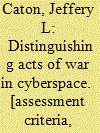

|
|
|
|
|
| Publication |
New Delhi, Alpha Editions, 2016.
|
| Description |
x, 102p.pbk
|
| Standard Number |
9789385505980
|
|
|
|
|
|
|
|
|
|
|
|
Copies: C:1/I:0,R:0,Q:0
Circulation
| Accession# | Call# | Current Location | Status | Policy | Location |
| 058777 | 355.343/CAT 058777 | Main | On Shelf | General | |
|
|
|
|
| 11 |
ID:
123719
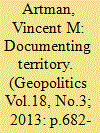

|
|
|
|
|
| Publication |
2013.
|
| Summary/Abstract |
Despite the crucial role it played in the 2008 war between Russia and Georgia, the phenomenon of passportisation has not received a great deal of scholarly attention. Much of the literature has treated the mass distribution of Russian passports to the residents of Abkhazia and South Ossetia as little more than a strategy to manufacture an excuse to go to war with Georgia. Drawing on recent scholarship on territory and territoriality, as well as with literature addressing Agamben's theories of exceptional spaces, this paper contributes to a more nuanced understanding of passportisation by analysing the territorial effects it produced. It argues that the wholesale conversion of Abkhazians and South Ossetians into Russian citizens did not merely manufacture a casus belli, it also produced exceptional spaces within the territory of the Republic of Georgia, where the norms of international law and the modern state system were effectively suspended.
|
|
|
|
|
|
|
|
|
|
|
|
|
|
|
|
| 12 |
ID:
130168
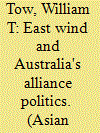

|
|
|
|
|
| Publication |
2014.
|
| Summary/Abstract |
Ongoing reassessments in U.S. strategy in the Asia-Pacific have coincided with a major growth in Sino-Australian economic relations. The Australian-American alliance could be increasingly tested if U.S. policy planners are unsuccessful in generating more sensitive and proactive alliance security postures to ensure Australian support for key U.S. interests in the Asia-Pacific
|
|
|
|
|
|
|
|
|
|
|
|
|
|
|
|
| 13 |
ID:
132785
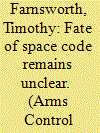

|
|
|
|
|
| Publication |
2014.
|
| Summary/Abstract |
A new draft of the European Union's proposed international code of conduct for activities in outer space was released during a May 27-28 meeting in Luxembourg, but despite the revisions, it is unclear which countries will support the code.
"We are fully aware that [the current draft] does not meet the concerns and expectations of all," Jacek Bylica of the EU, chairman of the meeting, said in his closing remarks.
The meeting was the last of a series of three consultations that began in Kiev in May 2013 and continued in Bangkok in November 2013. The meetings represented an effort to expand the group of negotiating states beyond the established spacefaring countries. (See ACT, May 2013.) During the three meetings, officials from more than 80 countries met to discuss elements of a code, with many disagreements remaining throughout the process
|
|
|
|
|
|
|
|
|
|
|
|
|
|
|
|
| 14 |
ID:
124395
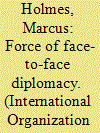

|
|
|
|
|
| Publication |
2013.
|
| Summary/Abstract |
Face-to-face diplomacy has long been the lynchpin of international politics, yet it has largely been dismissed as irrelevant in theories of cooperation and conflict-as "cheap talk" because leaders have incentives to dissemble. However, diplomats and leaders have argued for years that there is often no substitute for personally meeting a counterpart to hash out an agreement. This article argues that face-to-face diplomacy provides a signaling mechanism that increases the likelihood of cooperation. Face-to-face meetings allow individuals to transmit information and empathize with each other, thereby reducing uncertainty, even when they have strong incentives to distrust the other. The human brain has discrete architecture and processes devoted to parsing others' intentions via cues in face-to-face interaction. These processes enable actors to directly access the intentions of others with a higher degree of certainty than economic and game-theoretic models of bargaining predict.
|
|
|
|
|
|
|
|
|
|
|
|
|
|
|
|
| 15 |
ID:
140139
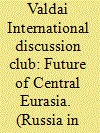

|
|
|
|
|
| Summary/Abstract |
The year 2014 saw Russia turn towards the East, establish a genuine strategic partnership with China, and embark on a radical transformation of its relations with the West. These historic changes coincided with the beginning of a new stage in Eurasian integration and the advancement of several strategic initiatives by Beijing. The most important of them is the Silk Road Economic Belt concept, a large-scale investment and transport/logistics project, announced in 2013.
|
|
|
|
|
|
|
|
|
|
|
|
|
|
|
|
| 16 |
ID:
123715
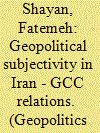

|
|
|
|
|
| Publication |
2013.
|
| Summary/Abstract |
This article enters into the debate about geopolitical subjectivity between Iran and the members of the Gulf Cooperation Council (GCC) on the three islands issue. The islands at the Western entrance to the Strait of Hormuz have so far been examined as an issue between Iran and the United Arab Emirates from historical, sovereignty and law perspectives, but this article examines the argument that the GCC has become a geopolitical subject through its support for the US policy of isolating Iran. Geopolitical subjectivity, a concept building on Pami Aalto's conceptual scheme, is the concept of goal-oriented ordering of territories and political space. We can use it to identify the GCC institution as a subject with the ability to act (and abstain from acting) and to examine Iran's response to the GCC's willingness to order the three islands. The conclusion is that the GCC became a subject in this context as soon as it felt the benefits of US support and the current rise of the soft power of Qatar. Even so, it has been unable to undermine Iran's sovereignty rights over the three islands, and the issue has strengthened, even exaggerated, states' adherence to the concept of sovereignty throughout the Persian Gulf region.
|
|
|
|
|
|
|
|
|
|
|
|
|
|
|
|
| 17 |
ID:
097939
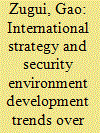

|
|
|
| 18 |
ID:
101899
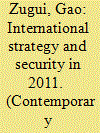

|
|
|
| 19 |
ID:
118495
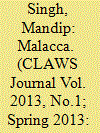

|
|
|
| 20 |
ID:
132094
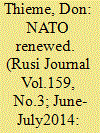

|
|
|
|
|
| Publication |
2014.
|
| Summary/Abstract |
As the NATO summit in Wales approaches, the US debate about the country's international strategy becomes more and more relevant, particularly in the light of recent developments in Eastern Europe and discussions about the role of the Atlantic Alliance post Afghanistan. Don Thieme explores some of the most pressing issues dominating this debate and suggests six reasons why the US needs to remain engaged in a renewed NATO.
|
|
|
|
|
|
|
|
|
|
|
|
|
|
|
|
|
|
|
|
|